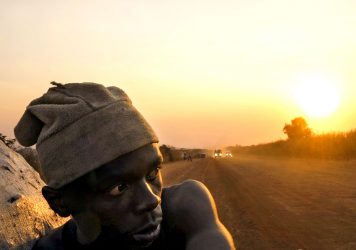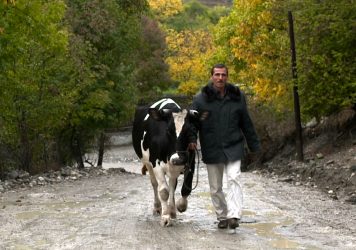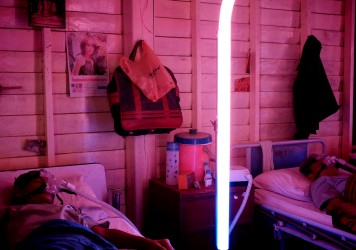Refugees and migrating crabs are the focus of this atmospheric doc which takes place on Christmas Island.
The wonky tingle of a theremin, which seems to have been channelled through some kind of echoey effects pedal, lends a supernatural aura to Aaron Cupples’ score for the documentary Island of the Hungry Ghosts. And per the title’s point-black declamation, Gabrielle Brady’s film is a ghost story in its own elemental way.
Its subjects are the human souls who have somehow become detached from their physical form, certainly in the eyes of neighbouring right wing governments whose insidious, militaristic crackdowns on immigration have caused untold suffering. These are the refugees and being stationed – apparently temporarily, probably indefinitely – in a detention centre on Christmas Island, a tiny speck in the ocean which sits south of Indonesia, but is an external territory of Australia.
Their only form of emotional respite comes from sessions with supremely empathetic trauma councillor Poh Lin Lee who, through the course of the film, discovers that she is a powerless pacifier, unable to help in the bureaucratic bidding these people so desperately need. As we hear their deeply upsetting stories, and see simple reenactments with the help of a childlike diorama, Brady tells the parallel tale of a mass migration of grabs from the island interior to the sea.
Transport links shut down, and volunteers build ad hoc bridges and damns from tree branches in an attempt to help the crabs along their perilous journey. Anyone travelling around the island needs to bring a broom with them so they can sweep the little blighters out the way of their oncoming tires. The crabs are referred to as the “hungry ghosts”, and locals build mighty pyres as a way to spiritually sanctify this natural wonder. So on one side you have people caged and abused, and animals treated as if they were royalty.
It’s a hushed, delicate film which is high on atmospherics and etherial landscape footage (care of cinematographer Michael Latham). And yet, the material is stretched mightily thin, and learning that this is an extension of Bandy’s 20-minute, 2017 short, The Island, comes as little surprise. The scenes of Poh Lin Lee interviewing refugees are undoubtedly powerful, but there are also sequences outside of her workspace which feel as if they have been performed for the camera, giving the film as a whole the bitter sense of contrived spectacle. Aesthetically speaking, all the footage here is worthwhile, it’s just the film makes its point a little too swiftly and obviously.
Published 10 Jan 2019
This critically lauded, if low-key, doc has been doing the festival rounds.
Was once a short, is now a feature. The upgrade doesn’t feel entirely justified.
There’s some amazing sequences here, but its overall thesis is stated a little too bluntly.

Emmanuel Gras documents one man’s daily grind in the Democratic Republic of Congo in this tough but compelling film.

By Tom Williams
This intimate film chronicles a simple rags to riches tale of a man and his cow.

By Vadim Rizov
Thai master Apichatpong Weerasethakul returns with a stunning meditation on a national and political crisis.